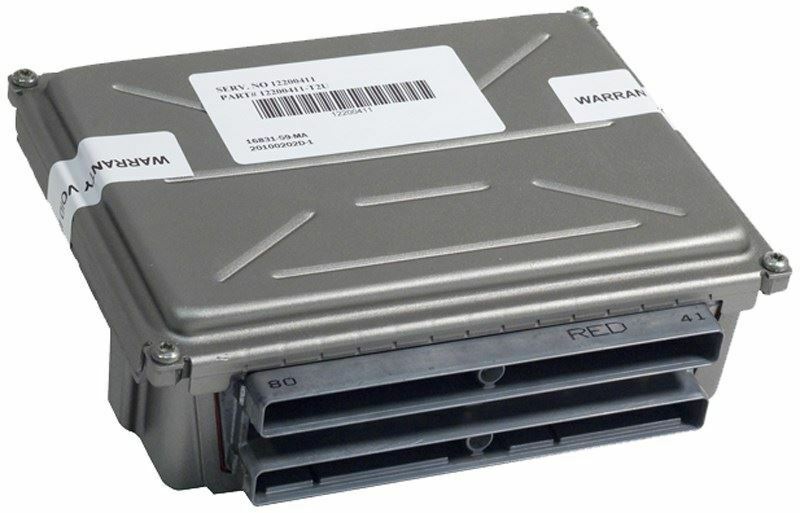Restore Peak Performance to Your Vehicle with a Programmed PCM
Is your 1998-1999 Pontiac Grand Am, or another compatible GM vehicle, suffering from perplexing issues like a persistent check engine light, stalling, rough idling, or erratic shifting? These are classic signs of a failing Powertrain Control Module (PCM), the electronic brain of your vehicle’s engine and transmission. A faulty PCM can disrupt everything from fuel delivery and spark timing to transmission operation, leading to poor performance, decreased fuel economy, and even a no-start condition. This replacement PCM, part number 9356741, is the definitive solution to restore your vehicle’s factory performance and reliability.
From the Diagnostic Bay
I once had a 1999 Grand Am with the 3.4L V6 come into the shop that was driving the owner crazy. The car would randomly stall at red lights and had a rough, surging idle. The owner had already replaced the spark plugs, wires, and the Idle Air Control (IAC) valve, but the problem persisted. A scan showed no hard codes, just intermittent communication errors. After checking the wiring harness for shorts, we focused on the PCM. We swapped in a known-good, programmed module, and the car immediately ran like new. The original PCM had failing internal drivers that weren’t setting a specific code but were causing havoc with engine management. It’s a reminder that when multiple, seemingly unrelated electronic issues pop up, the central computer is often the culprit.
Why Choose Our Pre-Programmed 1998-1999 Grand Am PCM?
Replacing a PCM isn’t just about swapping a box. The module must be specifically calibrated to your vehicle’s unique Vehicle Identification Number (VIN). Our service eliminates the need for an expensive trip to the dealership for programming. We handle the complex part for you. Simply provide us with your VIN during checkout, and our technicians will flash the module with the latest GM-certified software updates specific to your vehicle. This ensures that all parameters for your engine, transmission, and emissions systems are set correctly, providing a true plug-and-play installation experience.
Common Symptoms of a Failing PCM
- ✔ Check Engine Light: The light may be on constantly or intermittently, often with codes related to module communication (U-codes) or multiple sensor failures.
- ✔ No-Start or Hard Starting: The engine may crank but refuse to start, or take an excessively long time to fire up, due to incorrect fuel or spark commands.
- ✔ Poor Engine Performance: Noticeable loss of power, hesitation during acceleration, and rough idling are common symptoms.
- ✔ Reduced Fuel Economy: An inefficiently running engine, managed by a faulty PCM, will consume more fuel than necessary.
- ✔ Erratic Transmission Shifting: The PCM also controls transmission shift points. A failing module can cause harsh shifts, delayed shifting, or being stuck in one gear.
- ✔ Intermittent Stalling: The vehicle may stall for no apparent reason, either while driving or when stopped at an idle.
Installation and Relearn Procedures
Physical installation is straightforward. After disconnecting the battery, you will locate your old module, disconnect the wiring harnesses, and swap in the new unit. However, after installation, your vehicle will likely require a Security Relearn Procedure (also known as VATS or Passlock). This procedure syncs the new PCM with your vehicle’s anti-theft system and can typically be performed by the owner in about 30 minutes with no special tools. Instructions are readily available online for your specific model. Additionally, a Crankshaft Variation (CASE) Relearn may be necessary to prevent a misfire code. This procedure requires a bi-directional scan tool and can be completed by any qualified local mechanic.
Frequently Asked Questions
Do I need to get this module programmed by a dealer?
No. This is the primary benefit of our service. We program the module to your vehicle’s specific VIN before we ship it. It arrives ready for installation and the security relearn procedure.
What information do you need from me?
After you place your order, you must provide us with your 17-digit Vehicle Identification Number (VIN). This is essential for us to load the correct software for your car’s engine, transmission, and options.
Where is the PCM located on my 1999 Grand Am?
On the 1999 Grand Am and Alero, the PCM is typically located inside the vehicle, behind the trim panel on the driver’s side of the center console, near the accelerator pedal. Location can vary on other models.
Will this fix my car’s problem for sure?
This part will fix your vehicle if the PCM has been correctly diagnosed as the point of failure. If you are experiencing the symptoms listed above and have ruled out other components like sensors or wiring, a faulty PCM is the likely cause.
What is a CASE Relearn?
A CASE (Crankshaft Angle Sensor Error) Relearn is a calibration procedure that synchronizes the new PCM with the crankshaft position sensor. This ensures the computer can accurately detect engine misfires. It requires a scan tool and should be performed by a mechanic if a P1336 code appears after installation.


